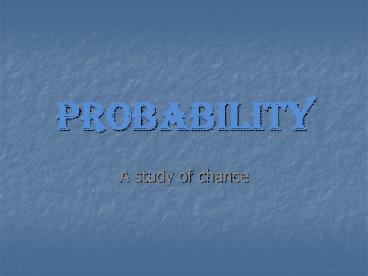Probability - PowerPoint PPT Presentation
1 / 12
Title:
Probability
Description:
Probability A study of chance Definitions Probability is the measure of how likely an event is The probability that a certain event will occur = number of ways ... – PowerPoint PPT presentation
Number of Views:227
Avg rating:3.0/5.0
Title: Probability
1
Probability
- A study of chance
2
Definitions
- Probability is the measure of how likely an event
is - The probability that a certain event will occur
- number of ways desired event can occur
- total number of possible outcomes
3
Example 1 A Spinner
- A spinner has 8 congruent parts, as follows.
Find the probability that the spinner lands on
the 2. Remember the formula number of
ways the event can occur total number of
possible outcomes How many 2s are there? How
many possible outcomes are there?
4
- So the probability of the spinner landing on a 2
is written as follows - P(2) 1/8
- How else could you write this probability?
5
- P(2) 1/8
- P(2) 0.125
- P(2) 12.5
6
Example 2 Same Spinner, Different Problem
What is the probability of landing on a black
sector (like a piece of pie)? P(Black Sector)
number of black sectors total number of
sectors P(Black Sector) 4/8 Again, we could
also write this probability as a Reduced
ratio P(Black Sector) ½ Decimal P(Black
Sector) 0.5 Percentage P(Black Sector)
50 Is it making sense?
7
Example 3 A Six-Sided Die
You roll a six sided die. What is the
probability you get an even number? P(Even
Number) number of even numbers on a die total
number of sides of a die P(Even Number) 3/6
½ 0.50 50 What is the probability of
rolling an odd number?
8
- Notice that the probability of rolling an even
number plus the probability of rolling an odd
number equals 1 or 100. This is because these
events are complements. The complement of an
event is the set of all events that are not
included in that event. - The event odd numbers on a die includes all
events except that of the even numbers.
9
Using Complements
- The probability of winning Pick Three is 1/1000.
What is the probability of losing Pick Three? - Notice that winning Pick Three and losing Pick
Three are complements.
10
The detailed solution
- Since they are complements, their probabilities
will add up to 1 (or 100). - P(winning) 1/1000
- So here is the math
- P(losing) P(winning) 1
- P(losing) 1/1000 1
- P(losing) 1 - 1/1000
- P(losing) 999/1000
11
Playing Cards
- You have a standard deck of playing cards. You
select one at random. - What is the probability that you select a king?
- P(king) number of kings in the deck
- total number of cards
- Find this solutionyou can do it!
- Do this one as well. What is the probability
that you do not select a king?
12
Assignment
- Complete the worksheet and turn in.

